The Fulani of Burkina Faso and Niger
The Heart of a Nomadic People
Article and photos by Irene Abdou
You are not alone if you have never heard of the countries of Burkina Faso and Niger or if you could not find them on the map. Two landlocked, neighboring countries in the heart of West Africa probably weren't on your wishlist of places to visit. You might even have trouble pronouncing their names ("Ber-kee-na Fah-so" and "Nee-jair"), or you might confuse Niger with its extensive and politically dominating neighbor to the south, Nigeria.
For many years, ranking at or near the very bottom of the United Nations Develop Programme Human Development Reports, the vast majority of the people of Burkina Faso and Nigeriens live on less than a dollar a day, and only 24 percent (Burkina) and 29 percent (Niger) of adults are literate. Malnutrition in children under five runs rampant at 38 percent and 40 percent, respectively, and over half the population of Niger still lacks access to safe drinking water. Yet, despite the hardships and challenges the people suffer daily, they preserve a rich culture and a colorful heritage, even as they offer undeniably refreshing hospitality. A trip to these two countries will provide memories for a lifetime to the adventurer at heart or to the intrepid cultural traveler.
|
Getting to Niger / Burkino Faso
Various European and American airlines fly to Niger and Burkina Faso, but the most inexpensive way to get there is probably by Royal Air Maroc, which offers a selection of flights from the U.S. and Europe that stop in Casablanca. Another aspect that might entice you is that Royal Air Maroc pays for food and lodging during your stopover in Morocco, and should you wish to stay longer, there is no extra cost.
|
While Burkina and Niger are home to more than seventy different ethnic groups, the Fulani (pronounced "Foo-lah-nee") are one of the majority groups. Their nomadic lifestyle, moving herds of cattle, sheep, and goats from place to place in search of water and fresh pasture, led the Fulani to traverse the African continent to finally settle in nearly every country across West Africa. A look at the Fulani of Burkina Faso and Niger offers a fascinating view of an African ethnic group whose footsteps trace from east to west and north to south and offers an understanding of the pastoral life that bonds a multitude of ethnic groups across the African continent.
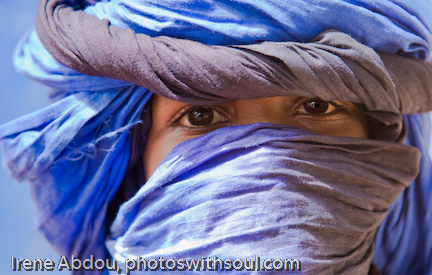
|
|
A ten-year-old Fulani boy named Aljouma wraps a blue turban around his head in a traditional nomadic fashion. The turban protects him from the harsh dust and wind of the Harmattan season. It provides the necessary protection for his rough pastoralist livelihood. The "Harmattan" season runs from November to January. While windy and dusty, it is also the cool, dry season and often the best time to visit.
|
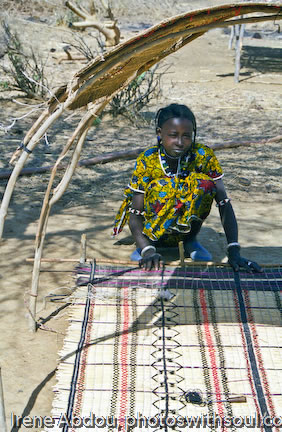
|
|
A young Fulani woman, 30 km from the town of Djibo in eastern Burkina Faso, weaves a grass mat (called "Gekko" in Fulfulde and pronounced "sek-koh"). The bark of the giant baobab tree is pounded into a string and used to tie long strips of wild grass reed together. With the advent of modern rice and other grain bags, the long white strips of synthetic bag material may now be used as a more durable and less work-intensive substitute for the traditional baobab string. Red and black cotton string is also interwoven with the grass in v-shape and criss-cross patterns. Completing a single grass mat may take 240 to 480 hours of work (equivalent to one to two months of non-stop, eight-hour days!)
|
|
Getting to Djibo
Djibo is in the heart of Burkina Faso's Jelgooji (pronounced "Jel-goh-jee") Fulani country and is the capital of the Soum Province. Approximately 200 kilometers on paved roads from Burkina's capital city of Ouagadougou, you can get to Djibo on one of several bus lines, such as the STMB, which travels several times daily to Djibo and back. Wednesdays, Djibo's weekly market day, are good days to visit. Look out for the thousands of cows, goats, and sheep at the animal market!
|
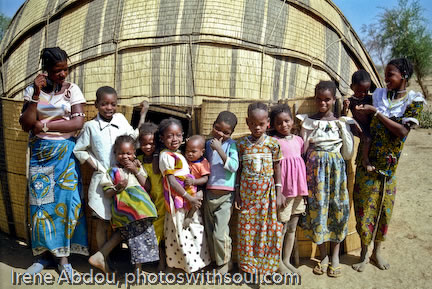
|
|
A Fulani family stands in front of their grass mat house. Called "study cake" (pronounced "soo-doo chek-keh"), which literally means "house of grass mats," the house is constructed from six grass mats that are held together and tied against wood poles. When moving, the house is easily disassembled and loaded onto donkeys or camels for transport. This type of grass mat and house is specific to the Jelgooji Fulani, whose recent roots trace back to the Jelgooji region of eastern Burkina Faso.
Imagine the area has a good water source (pond, river, or lake). In that case, a group of 50-200 people making up an extended family of relatives may temporarily settle in a single location for half the year. When these often temporary water sources dry up in the dry or hot season, they will move to a new location. At the same time, the young men will work as herders ("duroobe," pronounced "doo-roh-beh"), following the family's cattle from place to place, staying away from home for up to nine months of the year. During the rainy season, when ample grass and water are assured at "home," they will return the cows to join the rest of the family.
|
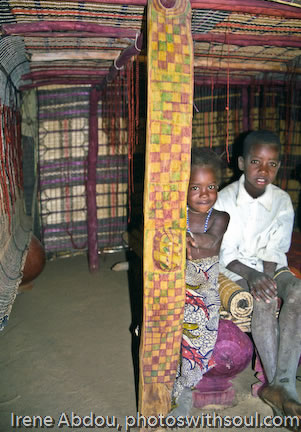
|
|
Two children sit on a millet stalk bed inside their grass mat house. Additional grass mats make a canopy top for the bed to store food, water, and other goods. The mats also drape down to the left of the bed for privacy. At night, additional mats are pulled down to shield the remaining sides of the bed.
Grass mat houses are used only in the dry season because rain turns the grass reeds black. So, during the May-September rainy season, the grass mats are put away, and houses made from straw are built. Like grass mat houses, houses constructed from straw mats can also be assembled and disassembled at will for easy transportation.
|
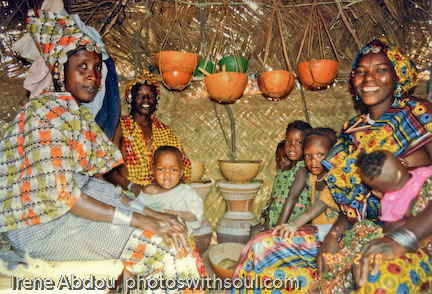
|
|
The village of Bele Kwara, 70 kilometers southwest of Niger's capital, Niamey, has quadrupled in size over the past ten years as the population of this tiny Fulani village has grown and its grown men returned home. A group of women and children socialize inside one of Bele Kwara's straw mat houses. In the background, calabashes filled with milk, food, and other items hang from the roof. Below the calabashes, a clay water pot keeps drinking water cool and within easy reach.
|
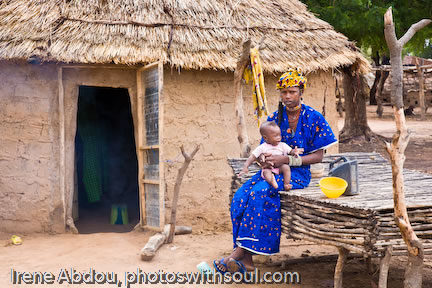
|
|
Despite the oncoming march of globalization, many Fulani have managed to maintain their nomadic livelihoods, while others have come to merge sedentary, subsistence agricultural lifestyles with their pastoralist roots. Settling down and building permanent mud houses and villages, only the young men of the family roam with the cattle for months on end. In this photo, a woman in Bele Kwara lives in a permanent mud hut with a straw roof. She sleeps outside on a bed made of wood sticks because the interior of the mud hut is unbearably hot.
|
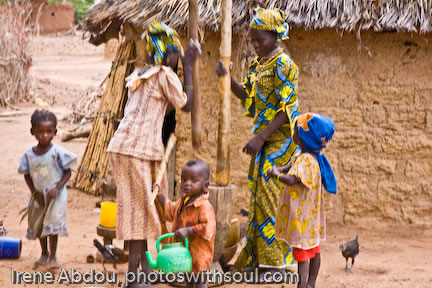
|
|
Two women work together in the "kitchen," pounding millet grain with mortar and pestle. First, they mix the grain with water, then pound it to separate the seed from the chaff.
|
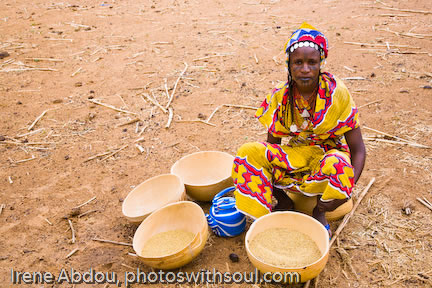
|
|
The chaff is then strained off with a strainer and mostly set aside as animal feed. The woman will also eat some of the chaff to gain weight, which is culturally desirable.
|
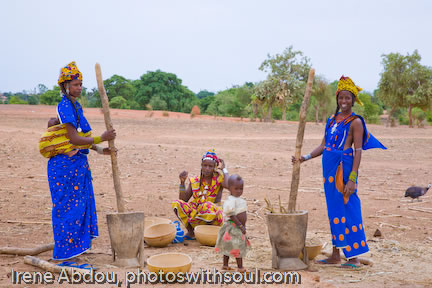
|
|
The separated seed is returned to the mortar and pounded and strained three more times to ensure all the grain is turned into flour.
|
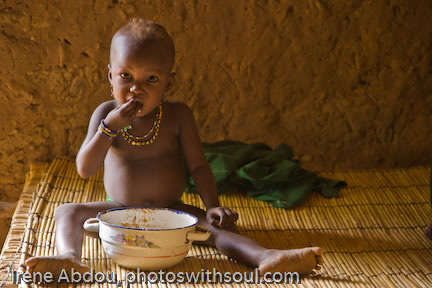
|
|
Bathed in early morning sunlight, a toddler eats breakfast in bed. In traditional African fashion, she breaks off a clump of millet "pot." She rolls it in her hand to form a ball before dipping it into sauce and eating. "Pot," similar to the Italian polenta, is made by boiling the pounded grain flour (millet, rice, corn, or sorghum) in water. Often served with okra sauce, the people of Bele Kwara can only afford to eat meat on special occasions. Despite their many cows, goats, and sheep, only for a very special occasion — such as a festival, baptism, wedding, or in honor of a special guest — will the Fulani kill an animal for food (except chickens and guinea fowl). The Fulani sell their cattle only when confronted with a severe financial disaster.
|
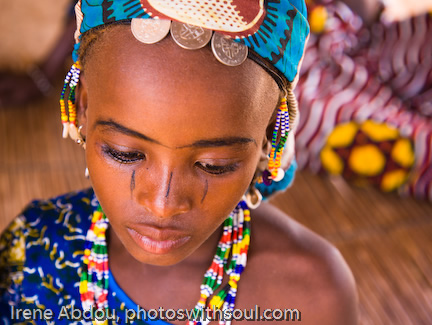
|
|
Dressed in her brightest, finest clothing and make-up and wearing the hallmark silver coin jewelry of the "Torodiibe" (pronounced "Toh-roh-dee-beh") Fulani of Niger, nine-year-old Dicko readies herself to walk the ten or so kilometers from Bele Kwara to the town of Torodi, where each Friday, hundreds of people from the surrounding villages converge for the weekly market. In Torodi, she will sell the fruit of the karey tree that she worked so hard to gather the past week.
|
.
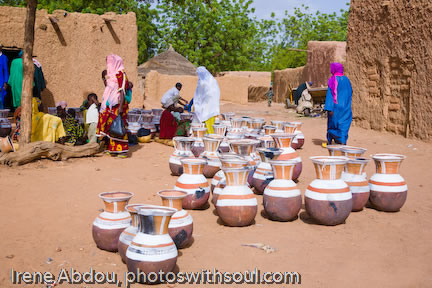
|
|
Hand-made clay pots for storing water are on full display in the Torodi market.
|
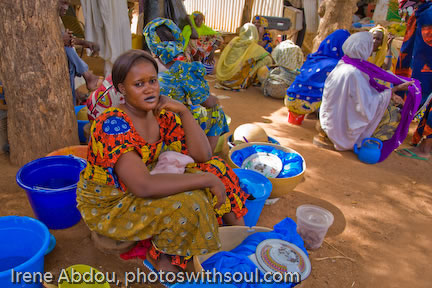
|
|
A woman from the Djerma ethnic group sits on the main Torodi throughfare selling "cobbal" (pronounced "chob-bal") and milk to the market-goers. Cobbal is made by pounding millet, boiling it, pounding it again with a small amount of water, then rolling it into a ball. The balls are mixed with milk and sugar and eaten like cereal.
|
|
Getting to Torodi
Only 60 kilometers from the capital city of Niamey, Torodi's weekly Friday market is a colorful, easy day visit. You can rent a car in Niamey for the one-hour drive, but if you're feeling adventurous, get up early in the morning and flag a city taxi to the "Torodi tessal" (Torodi taxi stop) and catch a 17-seater "bush taxi" to Torodi. You won't have long to wait for the van to fill up on Fridays, and you'll quickly find a return ride in the evening. The downside is that you'll be stuffed in a 17-seater van with up to 23 other people, and the van will stop numerous times along the way to drop off and pick up new riders. Plus, your van might not be in great shape. You might be driving rather slowly… So if you're feeling even more adventurous or are an experienced African traveler (make sure you speak French for this one!), go instead to the "Torodi Poste de Police" (Torodi Police Post) on the edge of town, cross the rope line, and hitch a ride with a well-to-do Nigerien or NGO vehicle. Within twenty minutes (chat up the police officers first), you'll catch a much more comfortable and faster ride to Torodi and back.
|
|
A Few Fulfulde Phrases
Learning a few words of the local language is key to any cultural experience abroad. This is the case in Burkina Faso and Niger as well. While French is the official language of both Burkina Faso and Niger, the reality is that, for the most part, only educated people speak it. With adult literacy rates at worldwide lows, most Burkinabés and Nigeriens speak only the "local languages" of their ethnic groups. So here are some greetings in Fulfulde (the language of the Fulani people):
Hello! (Also means “Thank you”)
Foofo!
(pronounced “foh-foh”)
Good morning (literal translation: “Did you pass the night in health?”)
Jam waali?
(pronounced “Jam waah-lee”?)
I’m fine (literal translation: “Only health.”)
Sey jam tann
(pronounced “Say jahm tanh”)
My name is ________.
Innde am _____
(pronounced “een-deh ahm ______”)
How much?
Foti?
(pronounced “Foh-tee”?)
Give me a cheaper price.
Al-Barka!
(pronounced “Al bar-kah”)
See you tomorrow!
Sey jaango!
(pronounced “Say jaahn-goh”)
|
Irene Abdou is a travel/documentary photographer, now based in Germantown, Maryland, USA. Irene has lived and worked in Africa and Asia for over twelve years. Her first foray into a developing country was in the 1990s as a Peace Corps Volunteer in Niger. She recently returned from two years in war-torn South Sudan, where she lived in a tent for the entire two years.
|
